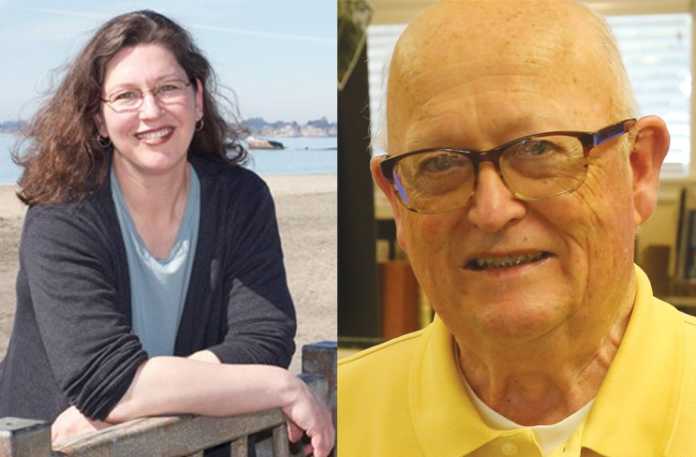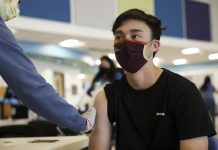WATSONVILLE — With three seats up for reelection, the Pajaro Valley Unified School District Board of Trustees could see its biggest shakeup in years.
Several challengers have pulled their papers to vie for the seats occupied by incumbents Willie Yahiro and Leslie De Rose.
When voters in Trustee Area 7 hit their polling places, they will have a choice between two new candidates. Trustee Jeff Ursino, who has occupied the seat since 2010, has elected not to run.
Retired engineer Bill Beecher and Watsonville Community Hospital nurse Jennifer Holm are vying for that seat.
Trustee Kimberly De Serpa, who represents the north portion of PVUSD, will be appointed to the seat in lieu of election after nobody lined up to run against her by the Aug. 10 deadline.
The Pajaronian interviewed Holm and Beecher for this story. Subsequent issues will feature the other candidates.
•••
Jennifer Holm
Holm began her career in internet development and design. That changed when she enrolled in Cabrillo College’s nursing program, and went on to earn a bachelor’s degree in nursing and then a master’s degree in nursing education.
Holm finished that degree in February, and currently works in the neonatal intensive care unit at Watsonville Community Hospital.
She is also a clinical nursing instructor at Cabrillo College.
She serves as a delegate to the Monterey Bay Central Labor Council, and as a board member on the California Nurses Association.
Holm said that serving on the PVUSD Board of Trustees would fit perfectly with her career.
“Improving basic literacy helps people when they are getting healthcare,” she said.
“As a nurse one of the things I see is how much education level affects peoples’ access to healthcare,” she said. “The advocacy I do in healthcare is a natural fit for my work as a school board member.”
Holm said that the rigors of earning her nursing degree have also prepared her for the attention to detail required for reading and absorbing the dense informational packets before board meetings.
In preparing for the role, she has also pored over the minutes from a year’s worth of trustees’ meetings and spoken with parents about the issues important to them.
“It’s a really complex issue and there is going to be a lot to learn,” she said.
Holm said she hopes her work on the school board can help her affect change for policymaking on a statewide level.
“Local politics is so important, and that is one of the reasons I’m running,” she said. “So much of what affects us on a day-to-day basis involves local politics.”
Holm has three children, two of whom have graduated from high school, and one who will be entering fifth grade at Rio Del Mar Elementary School in the fall.
If elected, Holm said she plans to hold open-door meetings for her constituents.
Holm praised the current board for its scrutiny of Measure L spending.
“That kind of accountability is great,” she said.
Holm said she wants the district to improve its transparency to the public, particularly during contract negotiations.
“Whether or not I’m successful, I can use my campaign to get the community to understand just how important these issues are,” she said. “As a community, if we pay attention to these issues I think the students will be better served.”
•••
Bill Beecher
Beecher attends nearly every Board of Trustees meeting. He frequently addresses the board, often providing his own informational handouts to trustees and media.
Beecher said his interest in school board affairs was sparked 11 years ago when he saw two articles on the first page of a local newspaper, one on low test scores in PVUSD schools, and the other on gang violence.
“I thought there must be a connection,” Beecher said. “If we’re not doing a good job of educating our kids, they might drop out and join gangs.”
Beecher said he helped form an ad hoc committee to study that issue, which determined that children who fall behind from kindergarten through third grade rarely catch up.
Beecher praised Superintendent Michelle Rodriguez, who he said is implementing a program that tackles that issue. The district last year launched Systematic Instruction in Phonological Awareness, Phonics, and Sight — known more familiarly as SIPPS — at Calabasas, Amesti and MacQuiddy elementary schools.
The district is rolling SIPPS out to a total of nine elementary schools this year.
Beecher also praised Rodriguez’s expansion of tutoring offerings during after-school programs, saying the extra help is needed to help reverse its dropout rate and low test scores.
“I like what she’s doing, and she needs a board that supports her,” he said.
When Beecher graduated from Watsonville High School in 1957, he said the school was ranked number three in California. Now, however, PVUSD schools lie at the bottom 10 percentile of the state.
“I want the kids today to get the same education I got,” he said.
Beecher said he was active in campaigning for Measure L, the $150 million bond passed by voters in 2012 to fund scores of construction, upgrade and repair projects at PVUSD schools. He also sits on the measure’s citizen’s oversight committee.
Beecher earned a degree in math with a minor in physics from San Jose State University, and then spent his career in engineering and administrative roles in the tech industry, first at Fairchild Semiconductor and then at Hewlett Packard. There, he oversaw a $200 million budget.
He said his ability to absorb and understand large amount of technical information has prepared him for the position.
“If you want to be a conscientious trustee you have to put a lot of time into understanding the issues and support the actions of the administration,” he said.
Beecher attends many board meetings and has been critical in the past of the district’s spending.
He questioned a recent decision by the Board of Trustees to give teachers a raise, which he said puts the district at risk of financial troubles if the economy takes a downturn.
He is also critical of the health plans PVUSD offers its employees, which he describes as “Cadillac” plans.
Many teachers, he said, don’t need such an expensive plan. Instead, he said that teachers should pay more for their insurance premiums, which in turn would translate to higher paychecks for employees and savings for the district.












